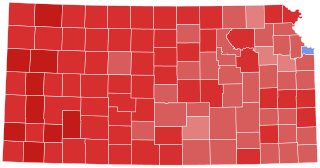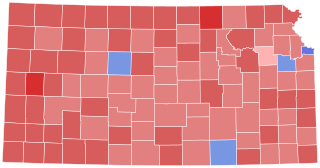
The 2004 United States Senate elections were held on November 2, 2004, with all Class 3 Senate seats being contested. They coincided with the re-election of George W. Bush as president and the United States House elections, as well as many state and local elections. Senators who were elected in 1998, known as Senate Class 3, were seeking re-election or retiring in 2004.

The 1998 United States Senate elections were held on November 3, 1998, with the 34 seats of Class 3 contested in regular elections. This was seen as an even contest between the Republican Party and Democratic Party. While the Democrats had to defend more seats up for election, Republican attacks on the morality of President Bill Clinton failed to connect with voters and anticipated Republican gains did not materialize. The Republicans picked open seats up in Ohio and Kentucky and narrowly defeated Democratic incumbent Carol Moseley Braun, but these were cancelled out by the Democrats' gain of an open seat in Indiana and defeats of Republican Senators Al D'Amato and Lauch Faircloth. The balance of the Senate remained unchanged at 55–45 in favor of the Republicans.

The 1996 United States Senate elections were held on November 5, 1996, with the 33 seats of Class 2 contested in regular elections. Special elections were also held to fill vacancies. They coincided with the presidential election of the same year, in which Democrat Bill Clinton was re-elected president.

The 1986 United States Senate elections were elections for the United States Senate. Held on November 4, in the middle of Ronald Reagan's second presidential term, the 34 seats of Class 3 were contested in regular elections. The Republicans had to defend an unusually large number of freshman Senate incumbents who had been elected on President Ronald Reagan's coattails in 1980. Democrats won a net of eight seats, defeating seven freshman incumbents, picking up two Republican-held open seats, and regaining control of the Senate for the first time since January 1981. This remains the most recent midterm election cycle in which the sitting president's party suffered net losses while still flipping a Senate seat.

The 1978 United States Senate elections were held on November 7, in the middle of Democratic President Jimmy Carter's term. The 33 seats of Class 2 were contested in regular elections. Special elections were also held to fill vacancies.

The 1974 United States Senate elections were held on November 5, with the 34 seats of Class 3 contested in regular elections. They occurred in the wake of the Watergate scandal, Richard M. Nixon's resignation from the presidency, and Gerald Ford's subsequent pardon of Nixon. Economic issues, specifically inflation and stagnation, were also a factor that contributed to Republican losses. As an immediate result of the November 1974 elections, Democrats made a net gain of three seats from the Republicans, as they defeated Republican incumbents in Colorado and Kentucky and picked up open seats in Florida and Vermont, while Republicans won the open seat in Nevada. Following the elections, at the beginning of the 94th U.S. Congress, the Democratic caucus controlled 60 seats, and the Republican caucus controlled 38 seats.

The 2010 United States Senate elections were held on November 2, 2010, from among the United States Senate's 100 seats. A special election was held on January 19, 2010, for a midterm vacancy in Massachusetts. 34 of the November elections were for 6-year terms to the Senate's Class 3, while other 3 were special elections to finish incomplete terms. Those 37 November elections featured 19 incumbent Democrats and 18 incumbent Republicans.

The Kansas Republican Party is the state affiliate political party in Kansas of the United States Republican Party. The Kansas Republican Party was organized in May 1859.

The 2006 United States Senate election in Missouri was held November 7, 2006, to decide who would serve as senator for Missouri between January 3, 2007, and January 3, 2013. This election was the fifth consecutive even-number year in which a senate election was held in Missouri after elections in 1998, 2000, 2002, and 2004.

The 1912–13 United States Senate elections were held on various dates in various states. They were the last U.S. Senate elections before the ratification of the Seventeenth Amendment in 1913, establishing direct elections for all Senate seats. Senators had been primarily chosen by state legislatures. Senators were elected over a wide range of time throughout 1912 and 1913, and a seat may have been filled months late or remained vacant due to legislative deadlock. Some states elected their senators directly even before passage of Seventeenth Amendment. Oregon pioneered direct election and experimented with different measures over several years until it succeeded in 1907. Soon after, Nebraska followed suit and laid the foundation for other states to adopt measures reflecting the people's will. By 1912, as many as 29 states elected senators either as nominees of their party's primary or in conjunction with a general election.

The 2008 United States Senate election in Kansas was held on November 4, 2008. Incumbent Republican U.S. Senator Pat Roberts won re-election to a third term.

The 2010 United States Senate election in Kansas took place on November 2, 2010, alongside other elections to the United States Senate in other states as well as elections to the United States House of Representatives and various state and local elections. Incumbent Senator Sam Brownback did not seek a third full term, but instead successfully ran for Governor of Kansas.

The 2010 congressional elections in Kansas were held on November 2, 2010, and determined who would survive the state of Kansas in the United States House of Representatives. Kansas has 4 seats in the House, apportioned according to the 2000 United States census. Representatives are elected for two-year terms; the elected served in the 112th Congress from January 3, 2011, until January 3, 2013.

The 2010 United States Senate election in Utah took place on November 2, 2010, along with other midterm elections throughout the United States. Incumbent Republican U.S. Senator Bob Bennett was seeking re-election to a fourth term, but lost renomination at the Republican Party's state convention. Mike Lee proceeded to win the Republican primary against Tim Bridgewater and the general election against Democrat Sam Granato. As of 2025, this is the most recent U.S. Senate election in which a political party held the seat after denying renomination to the incumbent senator.

The 1998 United States Senate election in Kansas was held November 3, 1998. Incumbent Republican U.S. Senator Sam Brownback won re-election to his first full term. Brownback was first elected in a special election held in 1996, when then-Senator Bob Dole resigned to campaign for U.S. President, after 27 years in the Senate.

The 1996 United States Senate special election in Kansas was held November 5, 1996, concurrently with the presidential election and the regularly scheduled election for the state's Class 2 seat. Incumbent Republican U.S. Senator and Senate Majority Leader Bob Dole, the Republican nominee for president, had resigned on June 11, 1996, in order to focus on his presidential campaign. Lieutenant Governor Sheila Frahm was appointed to the seat upon Dole's resignation, but she was defeated in the primary by Representative Sam Brownback, who went on to win the general election over Democrat Jill Docking.

The 2014 United States Senate election in Kansas was held on November 4, 2014, to elect a member of the United States Senate to represent the State of Kansas, concurrently with other elections to the United States Senate in other states and elections to the United States House of Representatives and various state and local elections.

The 2014 Kansas gubernatorial election took place on November 4, 2014, to elect the governor of Kansas, concurrently with the election of Kansas' Class II U.S. Senate seat, as well as other elections to the United States Senate in other states and elections to the United States House of Representatives and various state and local elections.

A general election was held in the U.S. state of Kansas on November 4, 2014. Primary elections were held on August 5.

The 2018 Kansas gubernatorial election took place on November 6, 2018, to elect the next governor of Kansas. Incumbent Republican governor Sam Brownback was term-limited and could not seek a third consecutive term.























